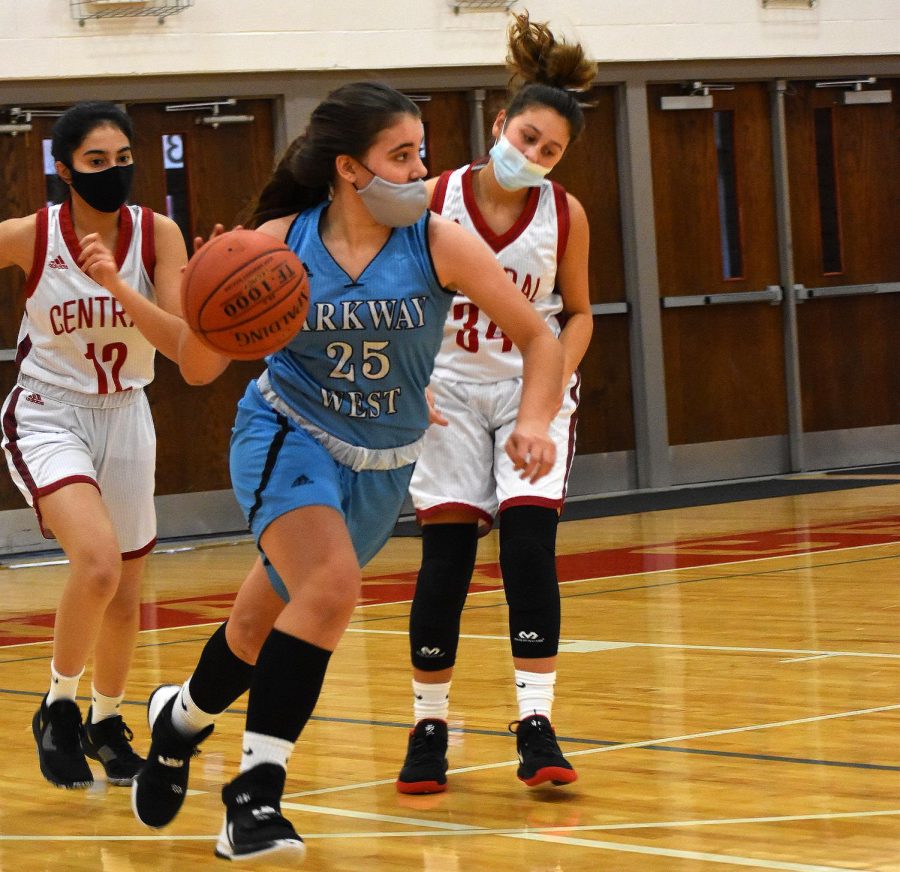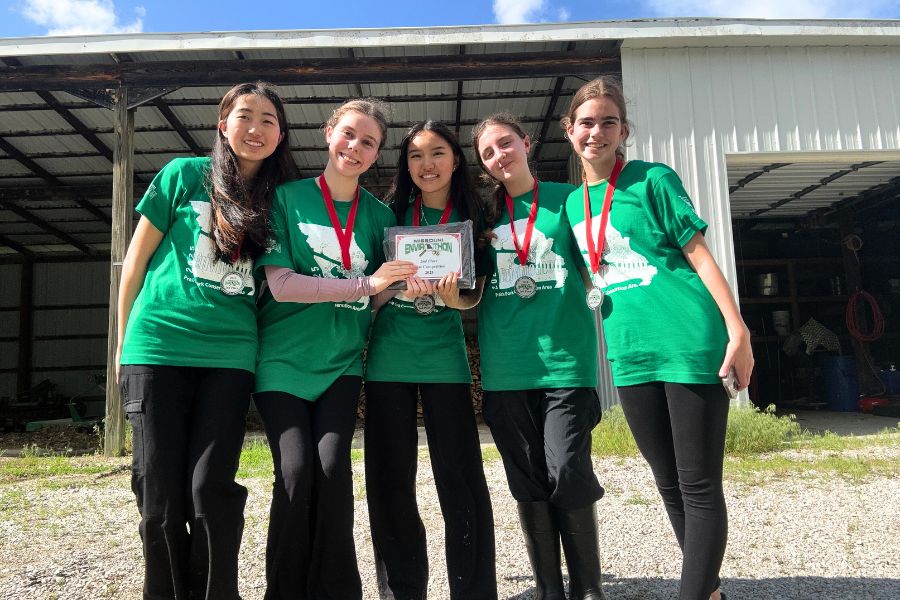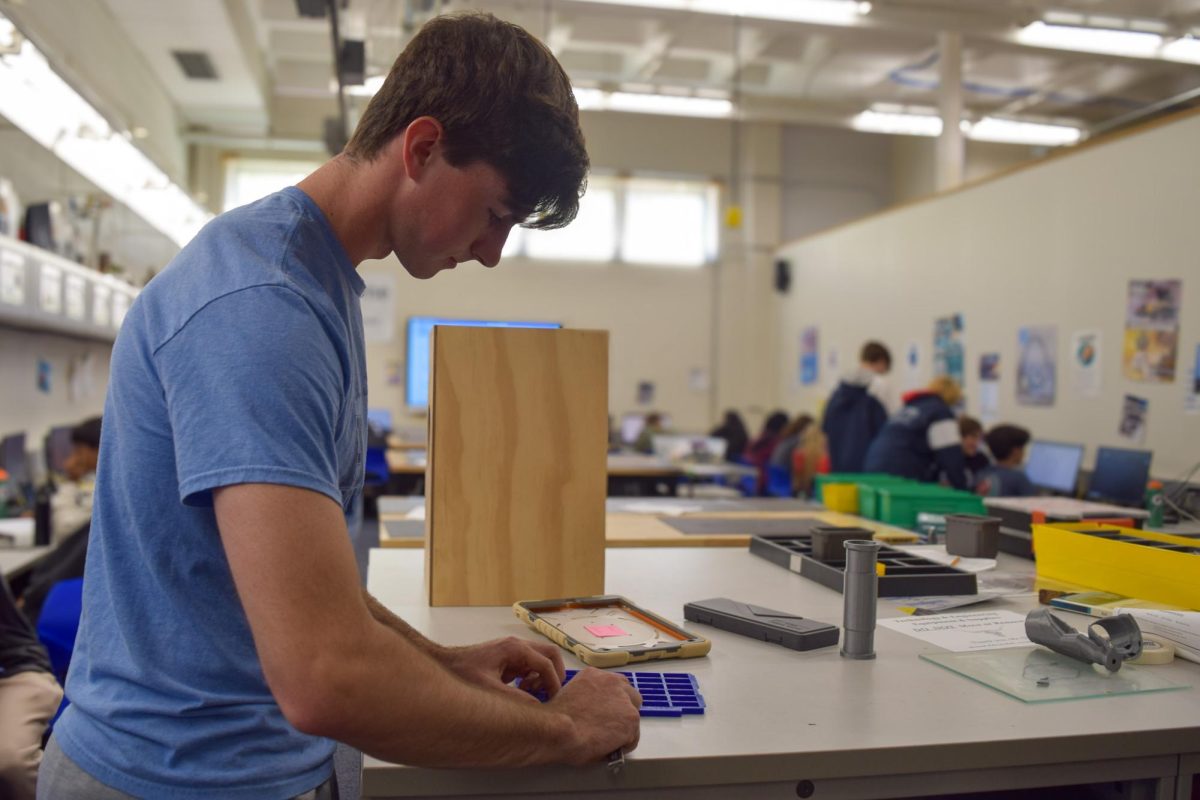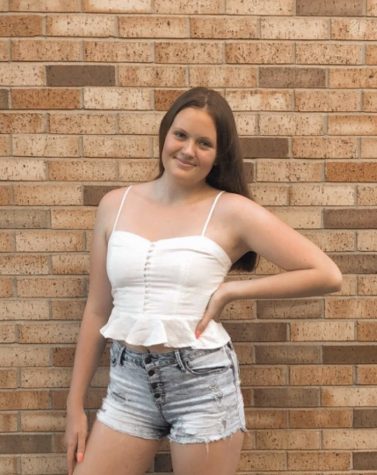Speeding down a hill and with her friend behind the wheel of their golf cart, sophomore Maddie Humme knew she was in for a bumpy ride. The cart flipped and Humme slid 20 feet stopping on hot, hard asphalt. Stuck inside the white and black metal contraption, pain and confusion filled her world as her foot was impaled. The smell of gas filled the air as it leaked, slowly creeping towards Humme’s leg and mixing with the road rash from the accident. She could hear her friend’s voice instructing someone to call an ambulance to take her to the hospital.
“I had never been hospitalized before, so this was all new to me,” Humme said. “My days were consumed by bandage changes and pain management. Along with forcing myself to eat in order to avoid having a feeding tube again. I was in so much pain medicine, the first week or so was a blur.”
Humme spent two weeks in the hospital. Due to COVID-19, only one person could visit Humme at a time and she could have a maximum of two visitors on her list: her mom and dad.
“My sister, stepdad and the rest of my friends and family could not visit me,” Humme said. “It was weird only being able to see one parent at a time and not being allowed to have other visitors such as my sister, extended family and friends. Thankfully, I was able to FaceTime my sister often. That was the longest I had ever gone without seeing her.”
It was difficult for Humme to be so separate from everyone in the hospital while she was trying to recover, but this was not her biggest concern.
“Being isolated gave me too much time to constantly replay the events that happened the day of the accident. My days were consumed by bandage changes and pain management,” Humme said
During her time in the hospital, Humme’s doctors focused on regaining her ability to walk again. After being released, she began physical therapy.
“It was tough to come to terms with not being able to properly walk at a normal pace. I was told that moving at a fast pace could cause further injuries which would lengthen my recovery process,” Humme said. “I was very used to doing everything at a fast pace and it was hard to slow down in physical therapy and relearn how to properly walk. Having to slow down during physical therapy caused me to face my limitations.”
In addition to attending physical therapy three times a week, Humme also had follow-up doctor appointments and surgeries, alongside daily at-home exercises.
“Every time I went to physical therapy it was a constant reminder of all my limitations and kept me wondering if I could ever fully recover,” Humme said. “I am not emotionally healed from the accident and likely will not be for a long time.”
Humme found physical therapy challenging, both emotionally and physically, and is continuing with her work to heal.
“Having my physical therapist work with me so closely and examine my injuries made me self-conscious,” Humme said. “Watching my teammates run without me was frustrating. This made me work very hard in physical therapy, in hopes that I would be able to return to sports.”
After the accident doctors were unsure if Humme would ever return to the athletic activities.
“I was very frustrated and disappointed,” Humme said. “That fueled me to work hard so I could prove them wrong.”
Humme has been cleared and has resumed playing for the girls junior varsity basketball team. While she is a leading scorer on the team, Humme knows she still has healing to do from the accident.
“From this point on, my recovery will continue to be a slow process,” Humme said. “It is far from over. This experience changed me in every way possible, and I learned that I was a lot stronger and more resilient than I thought.”
While the physical progress is clear, Humme is equally focused on healing emotionally.
“I need to heal emotionally in numerous ways, some of which I don’t think I even realize yet. I have noticed that I am extremely self-conscious when in public, and I feel like everyone is staring at me even when I have my compression on,” Humme said. “I know that my scars will be with me for the rest of my life, and this is something I still struggle with accepting. The fear of what could happen prevents me from enjoying living in the moment. I am not sure who to trust, and this is a feeling I’m not sure will go away anytime soon.”
Humme took away lessons from this experience that she will use going forward.
“Anything that we know to be true can change instantly. This experience helped me mature and I learned how one decision can have such a large impact, short and long term, on so many people,” Humme said. “The most important thing I realized is to never take anything for granted.”



![Focused on providing exceptional service, sophomore Darsh Mahapatra carefully cleans the door of a customer’s car. Mahapatra has always believed his customers deserve nothing less than the best. “[If] they’re trusting us with their car and our service, then I am convinced that they deserve our 100 percent effort and beyond,” Mahapatra said.](https://pwestpathfinder.com/wp-content/uploads/2025/10/DSC_0018-1200x800.jpg)
![Sophomore Aleix Pi de Cabanyes Navarro (left) finishes up a soccer game while junior Ava Muench (right) warms up for cross country practice. The two came to Parkway West High School as exchange students for the 2025-2026 school year. “The goal for the [exchange] program is to provide opportunities for both Parkway students and our international exchange students to learn about other cultures, build connections and become confident, capable, curious and caring — Parkway’s Four C’s — in the process,” Exchange Program Lead Lauren Farrelly said.](https://pwestpathfinder.com/wp-content/uploads/2025/10/Feature-Photo-1200x800.png)

![Gazing across the stage, sophomore Alexis Monteleone performs in the school theater. The Monteleone family’s band “Monte and the Machine” has been releasing music since 2012, but Alexis started her own solo career in 2024 with the release of her first single, Crying Skies. “My whole family is very musical, [and I especially] love writing [songs with them],” Monteleone said.](https://pwestpathfinder.com/wp-content/uploads/2025/09/DSC7463-1200x798.jpg)
![Amid teaching a lesson to her AP Calculus BC class, Kristin Judd jokes alongside her students in their funny remarks. Judd has always enjoyed keeping the mood light in her classroom, along with on the volleyball court. “[I enjoy] that side talk where you see [or] overhear a conversation and chime in, or somebody says something funny,” Judd said.](https://pwestpathfinder.com/wp-content/uploads/2025/09/image-1200x730.jpg)
![Eyeing the ball, junior Ella McNeal poses for her commitment pictures at Clemson University. McNeal’s commitment comes after months of contact with top Division 1 soccer programs. “ It has taken a lot to get to where I am, but I know that [what] I've already been through is just the beginning, and I can't wait for what is to come,” McNeal said.](https://pwestpathfinder.com/wp-content/uploads/2025/09/IMG_4926-1200x900.jpeg)


![Senior Adam Zerega stands with senior Dexter Brooks by farm equipment. Zerega often worked with friends and family on his farm. “I've been able to go to my family's farm since I was born. I [spend] at least three weekends a month [on the farm], so I'm there all the time,” Zerega said.](https://pwestpathfinder.com/wp-content/uploads/2025/04/IMG_4872-1200x900.jpg)

![After a thrilling point, senior Katie Byergo and junior Elle Lanferseick high-five each other on Oct. 8. With teamwork and camaraderie, Byergo worked together in the game against Lafayette High School. “[Byergo’s] is really positive with a good spirit,” Lanferseick said. “I set her [the ball] and she hits it [or] gets the kill.”](https://pwestpathfinder.com/wp-content/uploads/2025/10/DSC_9349-1-e1761159125735-1200x791.jpg)
![Leaning on the podium, superintendent Melissa Schneider speaks to Parkway journalism students during a press conference. Schneider joined Parkway in July after working in the Thompson School District in Colorado. “My plan [to bond with students] is to get things on my calendar as much as possible. For example, being in [classes] is very special to me. I am trying to be opportunistic [meeting] kids [and] being in [the school] buildings. I have all the sports schedules and the fine arts schedules on my calendar, so that when I'm available, I can get to them,” Schneider said.](https://pwestpathfinder.com/wp-content/uploads/2025/09/IMG_5425-1200x943.jpeg)

![Leaping through the air, senior Tyler Watts celebrates his first goal of the season, which put the Longhorns up 1-0 against the Lafayette Lancers. Watts decided to play soccer for West for his last year of high school and secured a spot on the varsity roster. “[Playing soccer for West] is something I had always dreamed of, but hadn’t really had a good opportunity to do until now. It’s [really] fun being out [on the field], and I’m glad I decided to join the team. It’s just all about having fun with the boys and enjoying what time we have left together,” Watts said.](https://pwestpathfinder.com/wp-content/uploads/2025/09/DSC_1951-1200x855.jpg)

![Shifting global trade, President Donald Trump’s tariffs are raising concerns about economic stability for the U.S. and other countries alike. “[The tariffs are] going to pose a distinct challenge to the U.S. economy and a challenge to the global economy on the whole because it's going to greatly upset who trades with who and where resources and products are going to come from,” social studies teacher Melvin Trotier said.](https://pwestpathfinder.com/wp-content/uploads/2025/05/MDB_3456-1200x800.jpg)

![Pitching the ball on Apr. 14, senior Henry Wild and his team play against Belleville East. Wild was named scholar athlete of the year by St. Louis Post-Dispatch after maintaining a high cumulative GPA and staying involved with athletics for all of high school. “It’s an amazing honor. I feel very blessed to have the opportunity to represent my school [and] what [it] stands for,” Wild said.](https://pwestpathfinder.com/wp-content/uploads/2025/05/unnamed-6-1200x714.jpg)
![Red, white and blue, the American flag holds the values of our democracy. The fight that we once endured has returned, as student journalists and senior correspondents across the country are losing their voices due to government control. “[Are] the White House and [the] government limiting free speech [and] freedom of the press? Yes [they are],” chief communications officer of the Parkway School District and former journalist Elisa Tomich said.](https://pwestpathfinder.com/wp-content/uploads/2025/03/Untitled-design-14.jpg)
![Freezing in their position, the Addams Family cast hits the “rigor mortis” pose after cast member and senior Jack Mullen, in character as Gomez Addams, calls out the stiff death move. For the past four months, the combined company of cast members, orchestra pit, crew and directors all worked to create the familial chemistry of the show. “I’m excited for [the audience] to see the numbers, the music, the scenes, but I also just love all the technical aspects of it. The whole spectacle, the costumes, makeup and the people that put in the work backstage in order to make the show successful on stage. I’m excited for people to see and appreciate that,” Mullen said.](https://pwestpathfinder.com/wp-content/uploads/2025/03/DSC0116-1200x800.jpg)
